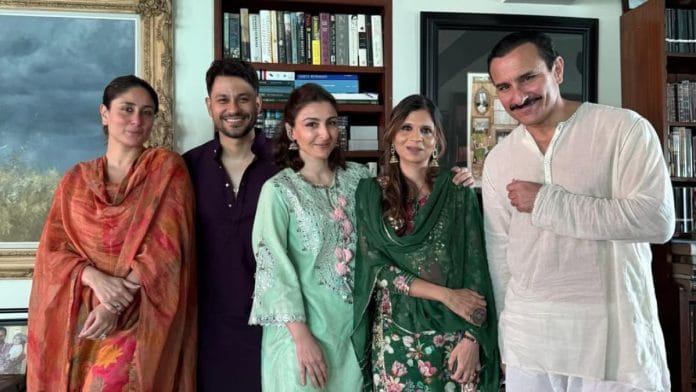New Delhi: In a major setback for Bollywood actor Saif Ali Khan and his family, the Madhya Pradesh High Court has dismissed a 25-year-old trial court order that upheld the family as the rightful owners of properties inherited from the erstwhile Nawab of the Bhopal princely state. Justice Sanjay Dwivedi has also directed the trial court to begin fresh proceedings, instructing that the matter be resolved within a year.
“After this order, Saif Ali Khan and his family—his two sisters and mother—cannot claim ownership over the Bhopal property. The court will now decide, after hearing all parties, what share, if any, they are entitled to,” said senior advocate Jagdish Chavan, who has represented Mansoor Ali Khan, Saif’s father, in the past.
The properties originally belonged to Hamidullah Khan, Saif’s great-grandfather and the last ruling Nawab of Bhopal. They include thousands of acres of land in and around Bhopal as well as estates such as Flag Staff House, Noor-Us-Sabah Palace Hotel, Dar-Us-Salam, and Ahmedabad Palace.
In 2015, the Enemy Property Department launched an inquiry into the transfer of Bhopal royal assets to the Pataudi family. A complaint alleged that the Nawab’s property should have been classified as ‘enemy property’ but was instead recognised as private, allegedly due to the family’s political connections. Saif Ali Khan had challenged the inquiry.
Under the Enemy Property Act, 1968, the government is empowered to seize the properties of individuals who migrated to Pakistan after Partition.
The Madhya Pradesh High Court intervention comes two decades after the district court’s order was challenged by other heirs of Nawab Hamidullah in 2000.
Rift in the family
On 30 April 1949, the princely state of Bhopal merged with the Union of India. During the merger, it was agreed that the Nawab’s personal property would be of their absolute ownership and that the succession of the Gaddi (throne) would be governed by the Bhopal Succession to the Throne Act, 1947.
Hamidullah Khan had two wives, Maimoona Sultan and Aftab Jahan. The senior Begum, Maimoona Sultan, had three daughters: Abida Sultan, Sajida Sultan, and Rabia Sultan.
Advocate Chavan, who has been following the case closely, said that as per the Bhopal Succession to the Throne Act, the property would go to the eldest son. But in case of no male heir, the throne and the property would go to the eldest daughter, who was Abida Sultan. But Abida migrated to Pakistan 10 years before the death of the Nawab in February 1960.
“If one goes by the succession act, Abida was the successor. But she was a resident of Pakistan and hence, the property would have simply been declared as enemy property,” Chavan said.
But friendship and influence saved the day for Sajida Sultan.
“At the time, Jawaharlal Nehru was the Prime Minister and shared a friendship with Iftikhar Ali Khan, the grandfather of Saif Ali Khan. So, a year after the death of Nawab Hamidullah Khan, his second daughter, Sajida Sultan—after Abida Sultan—was made the successor. Sajida was married to Iftikhar,” said the advocate, who added that he knew the case like the back of his hand.
As Sajida Sultan was made the successor, she retained the Nawab title and the Bhopal properties.
However, in the 1970s, Prime Minister Indira Gandhi abolished the privy purse—a payment made to the ruling families of former princely states as part of the merger—and discontinued royal titles. And the family’s internal rift came out into the open.
Also read: 1 Nawab, 3 daughters. Why prime real estate Saif Ali Khan inherited was declared ‘enemy property’
The wrong precedent
After Sajida Sultan was made the successor following the Nawab’s death, the other heirs were disappointed. However, since all of them were receiving the privy purse, the matter never escalated, said advocate Chavan.
“But after the privy purse was discontinued, Maimoona Sultan and the third child, Rabiya Sultan, filed a partition suit and sought a rendition of accounts of the Nawab’s property in the district court. They demanded partition under Muslim Personal Law (Shariat). This was in 1971,” Chavan said.
Another suit was filed by the family of Nawab Hamdullah Khan’s elder brother, Obaidullah Khan, who also received privy purses.
In February 2000, the district court in Bhopal pronounced a judgment on both the suits. “As per the judgment, according to Bhopal Throne Succession Act, 1947, and Notification of the Government of India, Sajida Sultan remained the successor of the entire property of Hamidullah Khan and no partition based on Muslim law was recognised,” said Chavan.
In its 2000 order, the district court had relied on a now-overruled precedent set by the Talat Fatima Hasan case, also known as the State of Rampur case.
Rampur was the first princely state to accede to India under Nawab Raza Ali in 1949. The case involved a five-decade-long dispute over the inheritance of the Nawab of Rampur’s properties, worth Rs 2,650 crore. It ultimately resulted in the property being divided among all legal heirs, including women, in accordance with the Shariat law.
“The grounds for the 2000 district court order in the Bhopal royal property dispute became null and void, as the State of Rampur precedent no longer held,” said Chavan.
The High Court has now ordered a fresh trial, keeping in view the evolving legal realities of the case.
“Saif Ali Khan, by my calculation, will receive only 2 to 3 per cent of the Nawab’s property,” Chavan said. “The family isn’t left with much legal recourse now.”
(Edited by Prasanna Bachchhav)






